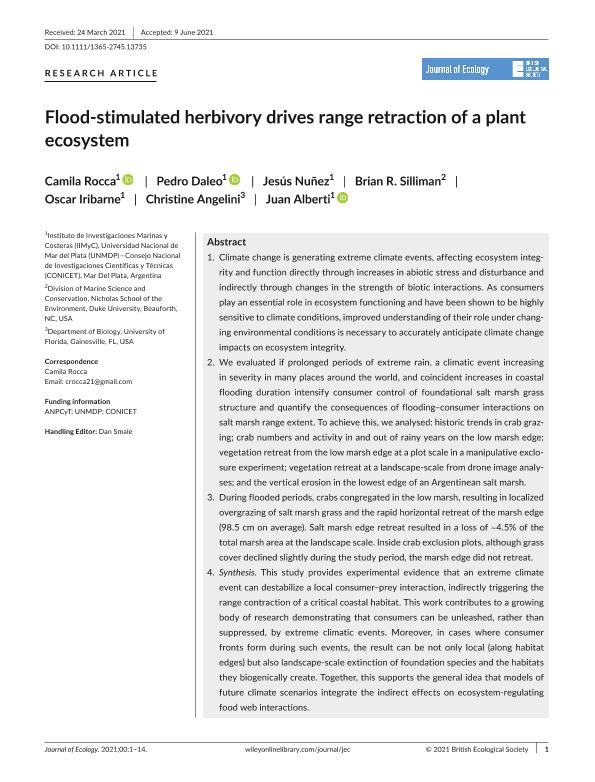Mostrar el registro sencillo del ítem
dc.contributor.author
Rocca, Camila

dc.contributor.author
Daleo, Pedro

dc.contributor.author
Nuñez, Jesus Dario

dc.contributor.author
Silliman, Brian Red

dc.contributor.author
Iribarne, Oscar Osvaldo

dc.contributor.author
Angelini, Christine
dc.contributor.author
Alberti, Juan

dc.date.available
2022-09-08T13:14:33Z
dc.date.issued
2021-06
dc.identifier.citation
Rocca, Camila; Daleo, Pedro; Nuñez, Jesus Dario; Silliman, Brian Red; Iribarne, Oscar Osvaldo; et al.; Flood-stimulated herbivory drives range retraction of a plant ecosystem; Wiley Blackwell Publishing, Inc; Journal of Ecology; 109; 10; 6-2021; 3541-3554
dc.identifier.issn
0022-0477
dc.identifier.uri
http://hdl.handle.net/11336/167914
dc.description.abstract
Climate change is generating extreme climate events, affecting ecosystem integrity and function directly through increases in abiotic stress and disturbance and indirectly through changes in the strength of biotic interactions. As consumers play an essential role in ecosystem functioning and have been shown to be highly sensitive to climate conditions, improved understanding of their role under changing environmental conditions is necessary to accurately anticipate climate change impacts on ecosystem integrity. We evaluated if prolonged periods of extreme rain, a climatic event increasing in severity in many places around the world, and coincident increases in coastal flooding duration intensify consumer control of foundational salt marsh grass structure and quantify the consequences of flooding–consumer interactions on salt marsh range extent. To achieve this, we analysed: historic trends in crab grazing; crab numbers and activity in and out of rainy years on the low marsh edge; vegetation retreat from the low marsh edge at a plot scale in a manipulative exclosure experiment; vegetation retreat at a landscape-scale from drone image analyses; and the vertical erosion in the lowest edge of an Argentinean salt marsh. During flooded periods, crabs congregated in the low marsh, resulting in localized overgrazing of salt marsh grass and the rapid horizontal retreat of the marsh edge (98.5 cm on average). Salt marsh edge retreat resulted in a loss of ~4.5% of the total marsh area at the landscape scale. Inside crab exclusion plots, although grass cover declined slightly during the study period, the marsh edge did not retreat. Synthesis. This study provides experimental evidence that an extreme climate event can destabilize a local consumer–prey interaction, indirectly triggering the range contraction of a critical coastal habitat. This work contributes to a growing body of research demonstrating that consumers can be unleashed, rather than suppressed, by extreme climatic events. Moreover, in cases where consumer fronts form during such events, the result can be not only local (along habitat edges) but also landscape-scale extinction of foundation species and the habitats they biogenically create. Together, this supports the general idea that models of future climate scenarios integrate the indirect effects on ecosystem-regulating food web interactions.
dc.format
application/pdf
dc.language.iso
eng
dc.publisher
Wiley Blackwell Publishing, Inc

dc.rights
info:eu-repo/semantics/openAccess
dc.rights.uri
https://creativecommons.org/licenses/by-nc-sa/2.5/ar/
dc.subject
CLIMATE CHANGE
dc.subject
CLIMATE–PLANT–HERBIVORE INTERACTION
dc.subject
ECOSYSTEM FUNCTIONING
dc.subject
EXTREME CLIMATE EVENTS
dc.subject
GLOBAL CHANGE ECOLOGY
dc.subject
HERBIVORE PRESSURE
dc.subject
NEOHELICE GRANULATA
dc.subject
SALT MARSH
dc.subject.classification
Ecología

dc.subject.classification
Ciencias Biológicas

dc.subject.classification
CIENCIAS NATURALES Y EXACTAS

dc.title
Flood-stimulated herbivory drives range retraction of a plant ecosystem
dc.type
info:eu-repo/semantics/article
dc.type
info:ar-repo/semantics/artículo
dc.type
info:eu-repo/semantics/publishedVersion
dc.date.updated
2022-09-06T18:40:47Z
dc.journal.volume
109
dc.journal.number
10
dc.journal.pagination
3541-3554
dc.journal.pais
Reino Unido

dc.journal.ciudad
Londres
dc.description.fil
Fil: Rocca, Camila. Consejo Nacional de Investigaciones Científicas y Técnicas. Centro Científico Tecnológico Conicet - Mar del Plata. Instituto de Investigaciones Marinas y Costeras. Universidad Nacional de Mar del Plata. Facultad de Ciencias Exactas y Naturales. Instituto de Investigaciones Marinas y Costeras; Argentina
dc.description.fil
Fil: Daleo, Pedro. Consejo Nacional de Investigaciones Científicas y Técnicas. Centro Científico Tecnológico Conicet - Mar del Plata. Instituto de Investigaciones Marinas y Costeras. Universidad Nacional de Mar del Plata. Facultad de Ciencias Exactas y Naturales. Instituto de Investigaciones Marinas y Costeras; Argentina
dc.description.fil
Fil: Nuñez, Jesus Dario. Consejo Nacional de Investigaciones Científicas y Técnicas. Centro Científico Tecnológico Conicet - Mar del Plata. Instituto de Investigaciones Marinas y Costeras. Universidad Nacional de Mar del Plata. Facultad de Ciencias Exactas y Naturales. Instituto de Investigaciones Marinas y Costeras; Argentina
dc.description.fil
Fil: Silliman, Brian Red. University of Duke; Estados Unidos
dc.description.fil
Fil: Iribarne, Oscar Osvaldo. Consejo Nacional de Investigaciones Científicas y Técnicas. Centro Científico Tecnológico Conicet - Mar del Plata. Instituto de Investigaciones Marinas y Costeras. Universidad Nacional de Mar del Plata. Facultad de Ciencias Exactas y Naturales. Instituto de Investigaciones Marinas y Costeras; Argentina
dc.description.fil
Fil: Angelini, Christine. University of Florida; Estados Unidos
dc.description.fil
Fil: Alberti, Juan. Consejo Nacional de Investigaciones Científicas y Técnicas. Centro Científico Tecnológico Conicet - Mar del Plata. Instituto de Investigaciones Marinas y Costeras. Universidad Nacional de Mar del Plata. Facultad de Ciencias Exactas y Naturales. Instituto de Investigaciones Marinas y Costeras; Argentina
dc.journal.title
Journal of Ecology

dc.relation.alternativeid
info:eu-repo/semantics/altIdentifier/doi/http://dx.doi.org/10.1111/1365-2745.13735
Archivos asociados
